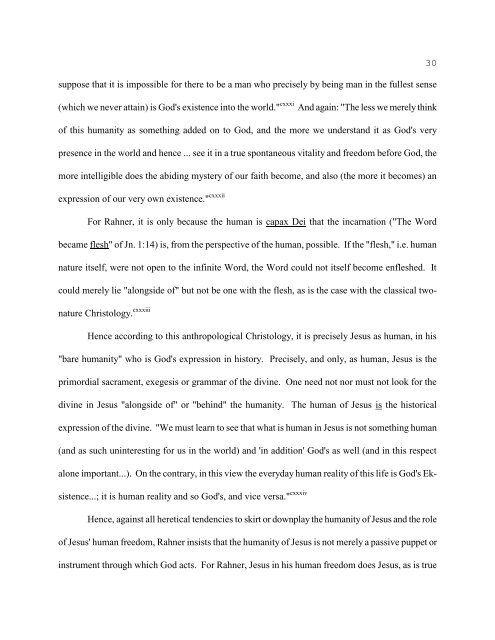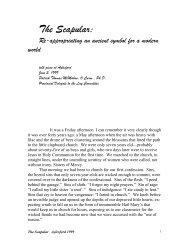Christocentrism of Charism – Buggert - CarmelStream
Christocentrism of Charism – Buggert - CarmelStream
Christocentrism of Charism – Buggert - CarmelStream
You also want an ePaper? Increase the reach of your titles
YUMPU automatically turns print PDFs into web optimized ePapers that Google loves.
suppose that it is impossible for there to be a man who precisely by being man in the fullest sense<br />
(which we never attain) is God's existence into the world." cxxxi And again: "The less we merely think<br />
<strong>of</strong> this humanity as something added on to God, and the more we understand it as God's very<br />
presence in the world and hence ... see it in a true spontaneous vitality and freedom before God, the<br />
more intelligible does the abiding mystery <strong>of</strong> our faith become, and also (the more it becomes) an<br />
expression <strong>of</strong> our very own existence." cxxxii<br />
For Rahner, it is only because the human is capax Dei that the incarnation ("The Word<br />
became flesh" <strong>of</strong> Jn. 1:14) is, from the perspective <strong>of</strong> the human, possible. If the "flesh," i.e. human<br />
nature itself, were not open to the infinite Word, the Word could not itself become enfleshed. It<br />
could merely lie "alongside <strong>of</strong>" but not be one with the flesh, as is the case with the classical two-<br />
nature Christology. cxxxiii<br />
Hence according to this anthropological Christology, it is precisely Jesus as human, in his<br />
"bare humanity" who is God's expression in history. Precisely, and only, as human, Jesus is the<br />
primordial sacrament, exegesis or grammar <strong>of</strong> the divine. One need not nor must not look for the<br />
divine in Jesus "alongside <strong>of</strong>" or "behind" the humanity. The human <strong>of</strong> Jesus is the historical<br />
expression <strong>of</strong> the divine. "We must learn to see that what is human in Jesus is not something human<br />
(and as such uninteresting for us in the world) and 'in addition' God's as well (and in this respect<br />
alone important...). On the contrary, in this view the everyday human reality <strong>of</strong> this life is God's Ek-<br />
sistence...; it is human reality and so God's, and vice versa." cxxxiv<br />
Hence, against all heretical tendencies to skirt or downplay the humanity <strong>of</strong> Jesus and the role<br />
<strong>of</strong> Jesus' human freedom, Rahner insists that the humanity <strong>of</strong> Jesus is not merely a passive puppet or<br />
instrument through which God acts. For Rahner, Jesus in his human freedom does Jesus, as is true<br />
30



